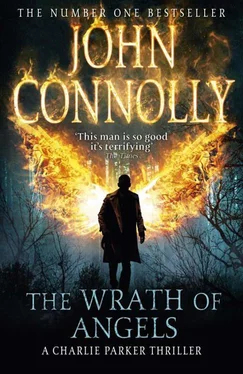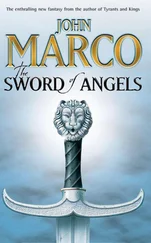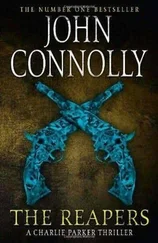She didn’t sound as though she thought this was a good thing.
‘It got worse after he met you, though,’ she said. ‘I think you fueled his fire.’
Epstein drank his tea. The accusation was clear, but he did not look away, or express sorrow. If this woman wanted someone to blame for what had happened to her children, perhaps her husband too, then he would accept that role as long as she told him what she knew.
‘What was he looking for, Mrs Wildon?’
‘Proof,’ she said. ‘Proof of the existence of life beyond this one. Proof that there was an evil beyond human greed and selfishness. Proof that he was right, because he always wanted to be right about everything.’
‘But there was a moral component to his work too, was there not?’
She laughed, and as her laughter faded it left a sneer on her face. Epstein realized that he disliked Eleanor Wildon, and he did not know why. He suspected that she was a shallow woman, and he allowed his eyes to take in his surroundings once more, seeking evidence in the furniture and paintings and ornaments to confirm his opinion. Then he saw the small framed photograph of two young girls on a shelf of Lladró porcelain, and was ashamed of himself.
‘A moral component?’ said Mrs Wildon. The sneer held for a second or two before melting, and when she spoke again she was walking in other rooms, living another life, and her voice came from somewhere far away. ‘Yes, I suppose there was. He was making connections between killings and disappearances. He spoke to retired policemen, hired private investigators, visited grieving relatives. When good people died in unusual circumstances, or vanished and were never seen again, he would try to find out all that he could about them, and about their lives. Most were just what they appeared to be: accidents, domestic situations that tipped over into violence, or just the misfortune of meeting the wrong person at the wrong time and suffering for it. But some . . .’
She stopped, and bit her lip.
‘Go on, Mrs Wildon. Please.’
‘Some he believed were being committed by one man, who moved through the northern states, both in this country and yours. There were police investigators who thought so too, but they could never make the connection, and it was all – what do you call it? – “circumstantial” anyway: a face in the crowd, a half-glimpsed figure on a video screen, nothing more. I saw the pictures. Sometimes there was another with him: a horrible-looking man, bald, with a swelling just here.’
She touched her hand to her throat, and Epstein started.
‘Brightwell,’ he said. ‘That one’s name was Brightwell.’
‘And the other?’ asked Mrs Wildon.
‘I don’t know.’ Wildon had hinted at some of this in cryptic messages to Epstein. He was a man with a love for the gnomic and the hidden.
‘That’s a pity,’ she said, ‘as he was the one who killed my children.’
She said it so matter-of-factly that Epstein was convinced for a second that he had misheard, but he had not. Mrs Wildon took a sip of tea, and went on.
‘What interested my husband was that these men, or people who looked very like them, seemed to turn up, their features no different, in old photographs and reports of crimes from thirty, forty, even fifty years earlier. There might have been a woman too, he thought, but she wasn’t involved as much, or was more careful than the others. He wondered how that could be, and he came up with an answer: they were not men or women but something else, something old and foul. Such nonsense. I’m sure I used that word with him – “nonsense” – but it still frightened me. I wanted him to stop, but he was so single-minded about it, so convinced that there was a truth to it.
‘And then they took my girls, and they buried them alive in a hole in the ground, and I knew that it wasn’t nonsense. There was no warning, no threats against our family if my husband continued to stick his nose into their business. There was only retribution.’
She put her cup down, and pushed the saucer away from her.
‘It was my husband’s fault, Mr Epstein. Those others, whoever or whatever they might be, killed my little girls, but my husband drew them down on us, and I hated him for it. I hate him, and I hate you for the encouragement that you gave him. You all share the blame for leaving my daughters to suffocate in a pit of dirt.’
There was that same, neutral voice. There was no anger to it. She might just as easily have been discussing returning a flawed dress to a store, or a movie that had disappointed.
After that, she and her husband had drifted apart, like wreckage from a sinking ship separated by shifting tides. She shared his desire to find and punish those responsible for the deaths of their children, but she did not want her husband in the same house with her, in the same room or the same bed. He left their home and went to live in one of the apartments that he owned, and he lost interest in his business affairs, and in his wife, and she in him. They were united only by memories, and a kind of hatred.
‘Then, on the night of July 13, 2001, he called me. He said that he had found the man who had killed our little girls, the man from the photographs. He was living in a place outside Sagueney, in a trailer park surrounded by crows.’
‘Did he have a name?’
‘He called himself Mr Malphas.’
An interesting choice, thought Epstein: Malphas, one of the great princes of Hell, a deceiver, an artificer.
The Lord of Crows.
‘My husband told me that they had him. They’d drugged him, and there was proof of what he had done, or was planning to do.’
‘They?’
‘There was a man who occasionally assisted my husband in his work. Douglas something – Douglas Ampell. He was a pilot.’
‘Ah,’ said Epstein. So he had been right about the source of the plane. ‘And what proof did your husband find?’
‘He was babbling. He was in a hurry. They had to get this man, this Malphas, away before his friends discovered what was happening. He said something about names, a list of names. That’s all.’
‘Did he say what he planned to do with Malphas?’
‘No, just that they were taking him to be questioned by someone else, someone who would understand, someone who would believe . That was the last time we spoke, but he warned me that if something happened to him, or if I didn’t hear from him again, I was to stay quiet. There was money in trusts, in hidden accounts, and I could sell the house. His lawyers had all of the details. I wasn’t to look for him, and I was to send all of the evidence he had collected to you, and you alone.’
Epstein was puzzled. ‘But I received nothing from you.
‘That’s because I burned it all, every last scrap of paper,’ she said. ‘It killed my daughters, and it killed my fool of a husband. I wanted no more part of it. I did what he told me to do. I stayed quiet, and I lived.’
Now he was certain. ‘He was on his way to New York,’ said Epstein. ‘He was bringing Malphas to me.’
‘Yes,’ said Mrs Wildon, this empty woman, this shell of grief, brittle as the Lladró figures that stared down from her shelves. ‘And I didn’t care. My husband didn’t understand. He never understood.’
‘Understood what, Mrs Wildon?’
Mrs Wildon stood. Their meeting was over.
‘That it wouldn’t bring them back,’ she said, ‘that it wouldn’t bring my little girls back to me. You’ll have to excuse me now, but I have a plane to catch. I’d like you to get out of my home.’
Malphas. I found that I had written the name on the open page of the Gazetteer .
‘Malphas was the passenger on the plane,’ said Epstein. ‘Ampell went missing on the same day as Wildon. He owned a Piper Cheyenne aircraft, which that week was based at a small private airfield just north of Chicoutimi. The plane has never been found, and Ampell never filed a flight plan. They didn’t want to draw attention to themselves, or their cargo. They didn’t want anyone to suspect, but Wildon had to tell his wife. He wanted her to know that he’d succeeded in finding this man, except she didn’t care. She blamed her husband for what had happened to their children: Malphas was just the instrument.
Читать дальше












